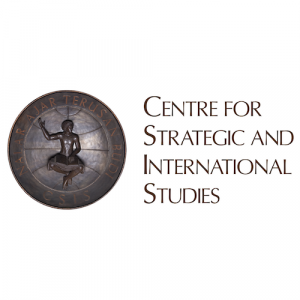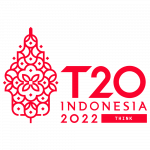Centre for Strategic and International Studies
Global Dialogue 2022
Windows for Recovering Together and Stronger
ABOUT US
This annual event is a platform to discuss emerging global issues and their solutions. The first Global Dialogue on "Global Disorder: The Need for New Regional Architecture and Business Model" was held in 2018 followed by another one in 2019 on "Harnessing Frontier Technologies: Redesigning National, Regional and Global Architecture". With the 2020 and 2021 events postponed due to the Covid-19 pandemic, this year's Global Dialogue in 2022 is held as a part of the T20, the G20's official engagement group with think-tank.
Objectives
The overall objective of this conference is to provide a platform to discuss the key challenges confronting the thinkers and leaders in managing the global economy recovery and mitigating future risks. The 2022 Global Dialogue will focus on how COVID-19 has disrupted every aspect of our lives but at the same time offered us a unique opportunity to reset as well as to reconnect. It will allow thought-leaders and stakeholders to exchange views on the adversities of COVID-19 and how to harness the opportunities to recover stronger. The Dialogue will in turn contribute to Indonesia’s G20 2022 presidency agendas with the spirit of recovering together and stronger. Thus, the overarching theme of the 2022 Global Dialogue is G20 Indonesia: Windows for Recovering Together and Stronger.
Plenary panel discussions
As of 5th February 2022, more than 6 million deaths have been recorded globally, and COVID-19 infections are still rising in 57 countries with new variants adding to the complexity of recovery. International cooperation appeared to be critical in ensuring the sharing of knowledge and the distribution of necessary health products beyond country borders. The production and distribution of vaccines also remained a focal point of discussion on international cooperation. However, how can the remaining challenges in deepening health cooperation be addressed? What are better approaches to be prepared and manage responses for possible future health crises - approaches that ensure all citizens regardless of nationality receive adequate access to healthcare? What can be done in creating opportunities and scaling up existing public-private coalitions? What would be the future of the health and the healthcare ecosystem along with the transformative technology in the sector that is reinventing access and delivery of healthcare services?
Lead Speaker: Tharman Shanmugaratnam
Chair: Tikki Pangestu, Visiting Professor at Yong Loo Lin School of Medicine, NUS
Panelists:
- Kunta Wibawa Dasa Nugraha, Secretary General of the Ministry of Health, Republic of Indonesia, and G20 Chair of Health Working Group
- Tjandra Yoga Aditama, Director Postgraduate Study, YARSI University and Professor, Faculty of Medicine, University of Indonesia
- Petro Terblanche, Managing Director, Afrigen Biologics
The COVID-19 pandemic has made inequality in societies and economies worse, making recovery difficult and uneven. However, this also offers a window of opportunity for transitioning towards quality growth. Countries, charting their path to recovery, will aim for environmental sustainability, economic resilience and socially inclusive policies and infrastructure. They will prioritise digital transformation to harness the potential of new technologies for greater efficiency and disseminating benefits. Regional cooperation will play a crucial role in leading global efforts towards the needed economic and societal transitions. All of these will require targeted policies, financial and technical support to governments and the private sector. This session will discuss what countries are doing for climate-resilience and broad-based economic recovery. What is the role of technology in offering sustainable and equitable outcomes? How can innovative financing models offer solutions to green recovery?
Lead Speaker: Armida Alisjahbana, Executive Secretary of the United Nations Economic and Social Commission for Asia and Pacific (UNESCAP)
Chair: Bambang Brodjonegoro, Former Minister of Finance of Republic of Indonesia, Lead Co-chair T20 Indonesia
Panelists:
- Mahendra Siregar, Vice Minister of Foreign Affair, Republic of Indonesia
- Kazuo Matsushita, Senior Fellow at the Institute for Global Environmental Strategies (IGES)
- Winfried Wicklein, Deputy Director General, Southeast Asia Department, ADB
- Sharon Seah, Senior Fellow & Coordinator, ASEAN Studies Centre, ISEAS–Yusof Ishak Institute
In the event of COVID-19 pandemic crisis where many businesses collapsed and people fell into poverty, the government has spent billions on stimulus and assistance that were urgently needed during the “rescue” phase. When the COVID-19 crisis recedes, the government will need to plan how to transition into a “recovery” phase in which stimulus would not be continuously given and rising debt issues should be dealt with. How would this transition affect the global economy and how developing countries address the future challenges amidst limited monetary and fiscal space? What can international cooperation and coordination achieve to address such systemic global risks?
Leading Speaker: Stijn Claessens, Head of Financial Stability Policy and Deputy Head of the Monetary and Economic Department, Bank for International Settlements
Chair: Park Cyn-Young, Director of the Regional Cooperation and Integration Division, ADB
Panelists:
- Febrio Kacaribu, Head of Fiscal Policy Agency (BKF)
- Haihong Gao, Director of Research Center for International Finance, Institute of World Economics and Politics, Chinese Academy of Social Sciences (CASS)
- Denis Hew, Director, APEC Policy Support Unit
- Alicia García-Herrero, Chief Economist for Asia Pacific at Natixis and Adjunct Professor at HKUST Business School
Due to the COVID-19 crisis and preceding trade tensions among leading economies, the flow of goods, services, and capital were disrupted on a historically unprecedented scale. Average container shipping rates increased eightfold, global transit times lengthened by more than 25%, and product shortages were widespread globally. As we recover and look to mitigate future disruption, new perspectives on connectivity and supply chain resilience is required. How to address the key challenges in the near-term recovery process? How would the multilateral and regional trading system remain relevant? What would be the necessary investments for building long-term, resilient supply chains? What international architecture is needed for the future of connectivity, such as the digital economy and society, to ensure inclusivity for MSMEs?
Chair: Fukunari Kimura, Chief Economist, ERIA
Panelists:
- Mia Mikic, Advisor at Large at ARTNeT- Asia Pacific Research and Training Network
- Amalia Adininggar Widyasanti, Deputy Minister for Economic Affairs, Bappenas
- Hosuk Lee Makiyama, Director of European Centre for International Political Economy (ECIPE)
- Bani Maulana Mulia, CEO of PT Samudera Indonesia
Developing countries in the Asia-Pacific region suffered from differences in education quantity, quality and output prior to the COVID-19 pandemic. These differences rose further in 2020-2021 as governments called for partial or full school closures to limit the spread of the virus. The pandemic aggravated the education divide as students from low-income households suffered from a lack of access to internet connectivity and adequate technology. The shock to the education sector will result in long-term losses in students’ learning which in turn will affect their future job prospects and earnings. It will also affect labour productivity, economic growth, and the social cohesion of a country. However, by prompting unprecedented adoption of digital technology, the pandemic also provides an opportunity to achieve inclusive and resilient growth through digital transformation. There are concerns that new technologies and innovation may displace unskilled or routine jobs, aggravating economic inequalities. In order to unleash the digital potential, the education gap must be bridged and an inclusive way of human capital development must be developed. The session aims to explore the issue of learning losses, growing inequality, and the way governments can work to mitigate some of these challenges going forward. What is the role of education to narrow inequality and deliver greater social cohesion? What is the role of education to narrow the digital divide and maximize the potential of technologies for inclusive growth? What is the role of policies and institutions to enhance human productivity in the digital economy and mitigate new technology’s impact on inequality?
Lead Speaker: Chris Rowley, Professor Emeritus, Bayes Business School, City, University of London, and Visiting Fellow, Kellogg College, University of Oxford
Chair: Tetsushi Sonobe, Dean and CEO of the Asian Development Bank Institute (ADBI)
Panelists:
- Zia Qureshi, Visiting Fellow, Global Economy and Development, Brookings Institution
- Sukti Dasgupta, Chief Employment and Labour Market Policies, ILO
- Lorraine Salazar, Senior Knowledge Expert, McKinsey’s Telecommunications, Media and High Tech (TMT) Practice
Looking ahead, robust recovery will depend on a wide range of political, leadership and global economic governance factors. What should global economic governance be like in the post-COVID world? What are the immediate priorities for major international institutions (such as the UN, IMF, WHO, World Bank, WTO, etc.) and regional institutions (such as ASEAN, BRICS, APEC, etc.)? How to ensure that global governance can address the economic and social transformation needed towards a sustainable economy? How do we ensure such large scale cooperation to work? What can we learn from existing cooperation during the health, climate, and financial crises? How can we strengthen such cooperation and permeate the principles of low-carbon, resiliency, and inclusivity in the future actions? This session will focus on inputs for Indonesia as Chair of G20 2022 and ASEAN 2023.
Panelists :
- Peter Drysdale, Emeritus Professor of Economics and the Head of the East Asian Bureau of Economic Research and East Asia Forum at the Crawford School of Public Policy
- Anna-Katharina Hornidge, International Advisory Board of T20 Indonesia, Director of the German Development Institute / Deutsches Institut für Entwicklungspolitik (DIE) and Professor for Global Sustainable Development at the University of Bonn
- Zhang Yunling, International Advisory Board of T20 Indonesia, Professor, Academy Member and Director of International Studies, Chinese Academy of Social Science (CASS)
- Djisman Simandjuntak, Lead Co-Chair of T20 Indonesia, and Chair of CSIS Foundation
Chair: Shafiah Muhibat, Deputy Executive Director for Research, CSIS
Indonesia’s Response :
- Sri Mulyani Indrawati, Minister of Finance of Republic of Indonesia
Agenda
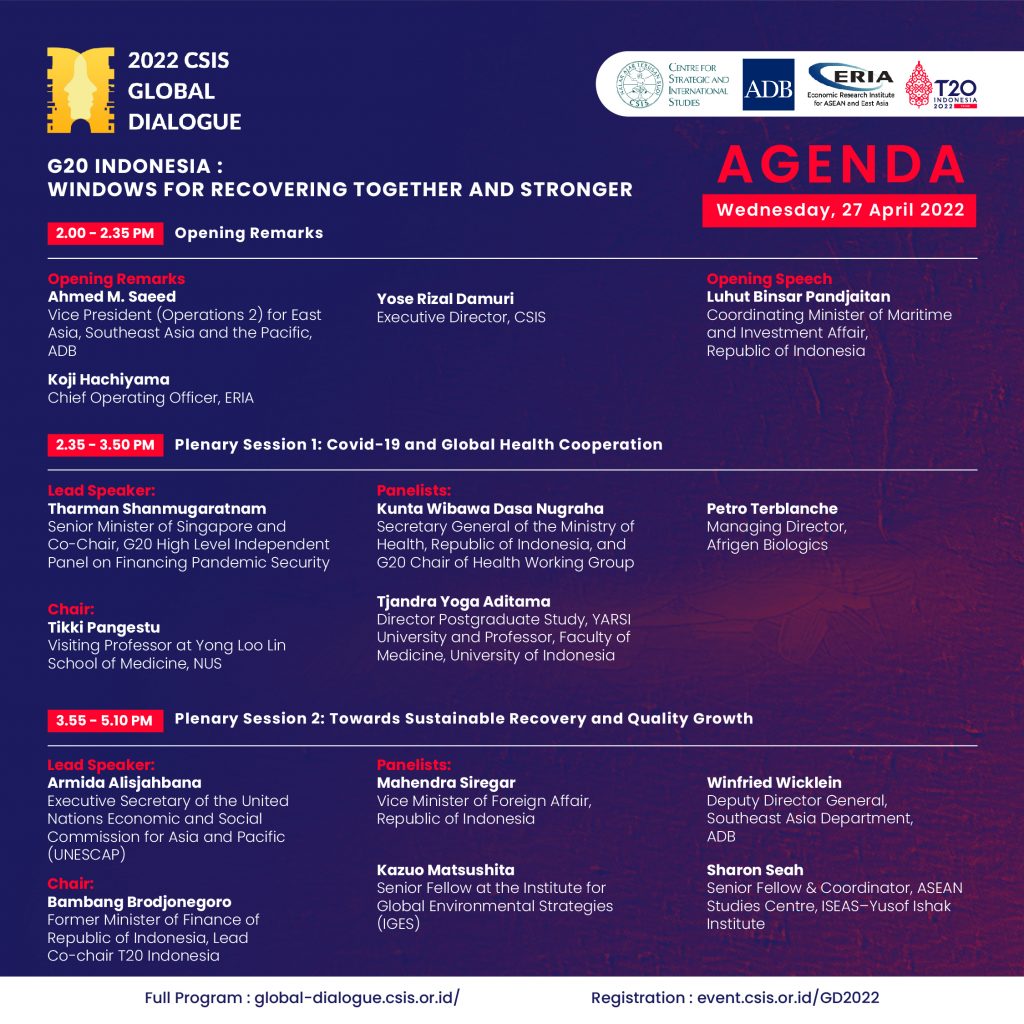
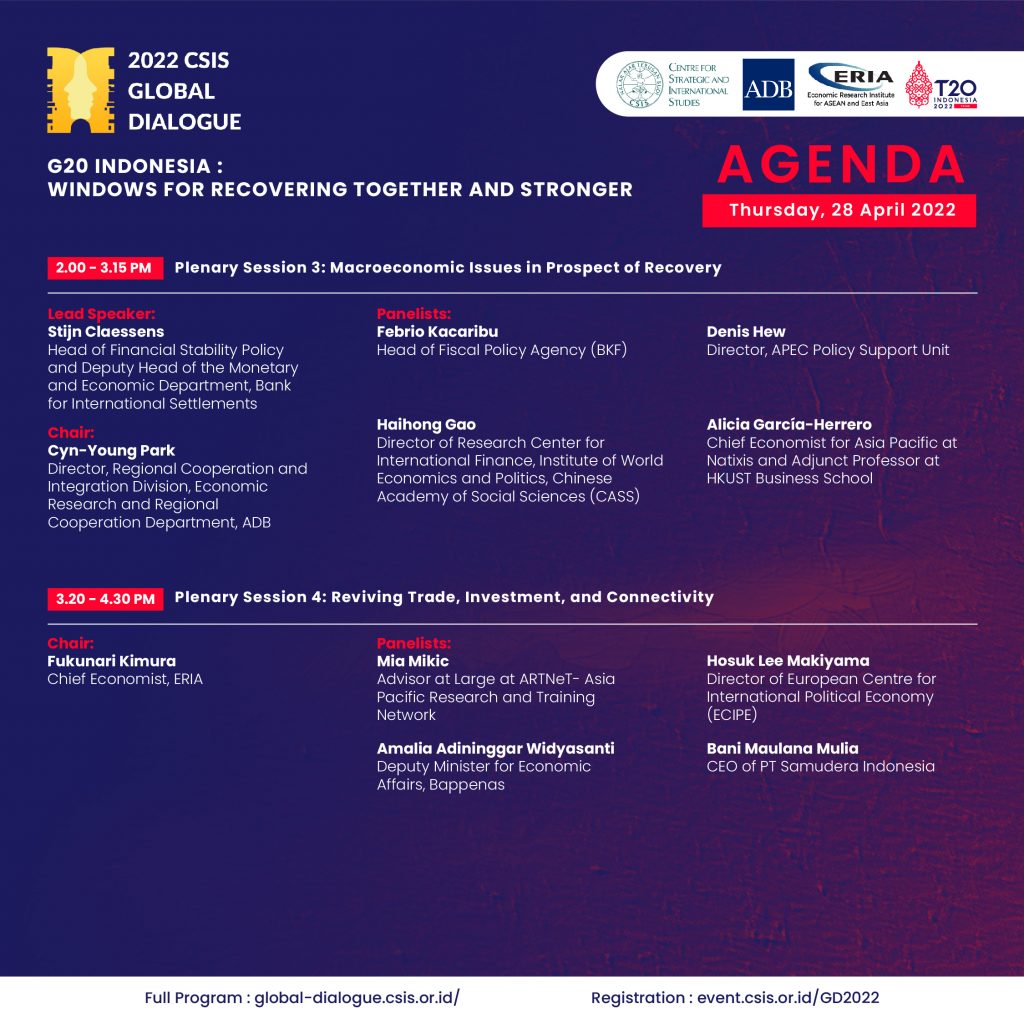

Event Calendar
Plennary Sessions
Featured Speakers
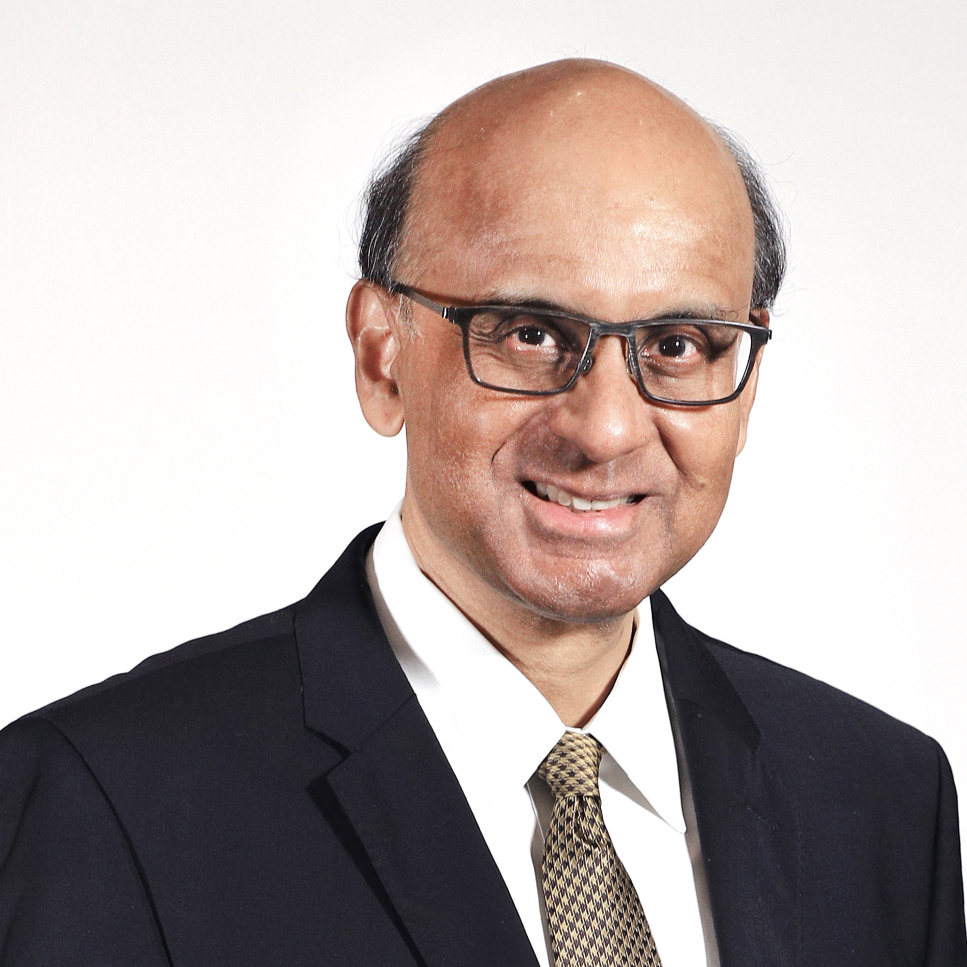

Tharman Shanmugaratnam
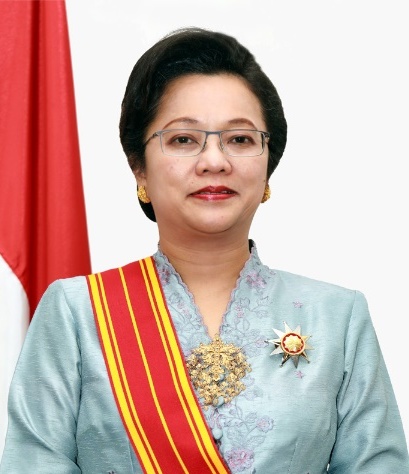

Armida Alisjahbana
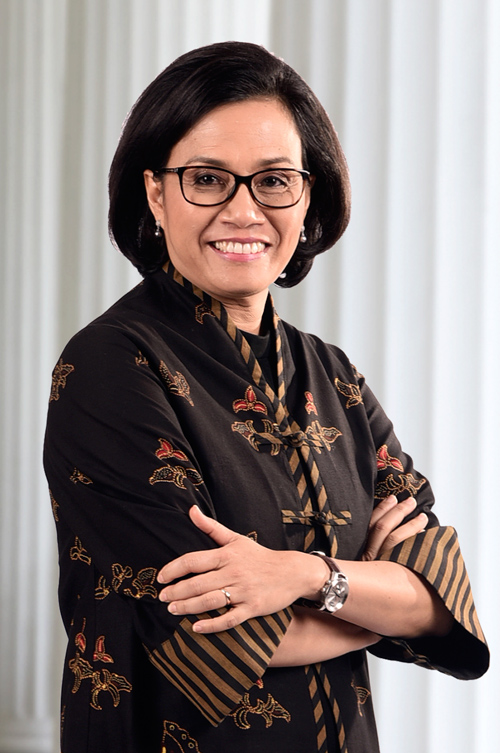


Sri Mulyani Indrawati

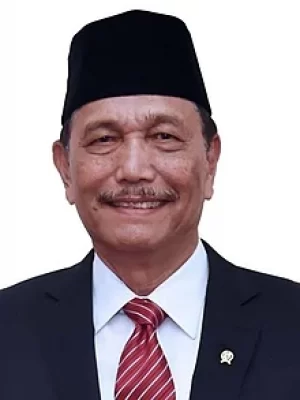
Luhut Binsar Pandjaitan
Gallery

For more information
Centre for Strategic and International Studies
Pakarti Centre Building, Jl. Tanah Abang 3 No. 23-27, Jakarta 10160, Indonesia
Phone: +62 21 386 5532
Email: global.dialogue@csis.or.id

